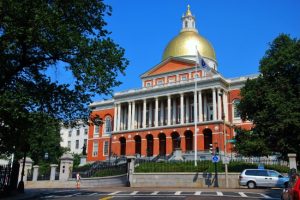 Plainridge Park casino fuels Massachusetts’ coffers and boosts the state’s economy. An economic impact study that gauges the economic effects of the gambling industry on the state of Massachusetts found out that Plainridge Park generated a massive tax revenue of $100 million, adding the creation of long-term jobs for its full year of operation. The gambling venue was reported to be valuable to the economic growth of the state and it brings back more than $100 million to the state, which otherwise would be siphoned off by other casinos outside Massachusetts’ borders.
Plainridge Park casino fuels Massachusetts’ coffers and boosts the state’s economy. An economic impact study that gauges the economic effects of the gambling industry on the state of Massachusetts found out that Plainridge Park generated a massive tax revenue of $100 million, adding the creation of long-term jobs for its full year of operation. The gambling venue was reported to be valuable to the economic growth of the state and it brings back more than $100 million to the state, which otherwise would be siphoned off by other casinos outside Massachusetts’ borders.
In June 2015, Penn National Gaming (PNG) celebrated the grand opening of its Plainridge Park casino in Massachusetts, which is the first of three commercial casinos in the state. On Thursday, the results of the survey conducted by the University of Massachusetts Donahue Institute were presented to the state’s Gaming Commission. According to the figures, Massachusetts gained a total of $172 million in tax revenues from Plainridge Park for the period from July 2015 to June 2016. The casino’s contribution to the state is an indication of its performance and the state’s wise decision to legalize gambling within its borders.
Plainridge Park’s Progress in Figures
 Thomas Peake, a research analyst on the study noted that highest portion, and more precisely 58% of the spending at Plainridge Park came from Massachusetts residents. All of them shared that they would have gambled in another casino outside Massachusetts providing that the state did not regulate the casino industry. The other portion of spendings, estimated to be $36 million, or 20.8% of the total turnover of the casino came from residents of other states than Massachusetts and 21% came from non-gambling activities at the casino.
Thomas Peake, a research analyst on the study noted that highest portion, and more precisely 58% of the spending at Plainridge Park came from Massachusetts residents. All of them shared that they would have gambled in another casino outside Massachusetts providing that the state did not regulate the casino industry. The other portion of spendings, estimated to be $36 million, or 20.8% of the total turnover of the casino came from residents of other states than Massachusetts and 21% came from non-gambling activities at the casino.
Speaking of the numbers, Commission Chairman Stephen Crosby explained that the official’s main goal in regulating casino industry was to bring the gambled away money back in Massachusetts. Prior to the legalization of the casino industry in Massachusetts, it was estimated that the players are spending around $1 billion on gambling activities elsewhere, while Massachusetts was losing this money, which could support its economy.
Apart from the solid tax revenues, Plainridge Park gave a job to many people and significantly decreased the unemployment rate. According to the statistics, Plainridge created 556 long-term job places, while, at the same time, boosting the small- and medium-sized local business. It is interesting to note that the survey found out that most of Plainridge’s workers are residents of the Massachusetts’ city Attleboro.
A key motivator behind regulating the casino industry is to secure an additional source of tax revenue. More and more states started to realize that no prohibition can efficiently prevent players from gambling and instead of introducing strict limitations, they can benefit from regulating it.



















